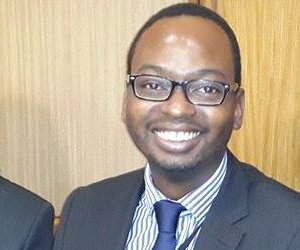 He’s young, ambitious, energetic, and ready to ring in the changes. Meet the new man about the House.
He’s young, ambitious, energetic, and ready to ring in the changes. Meet the new man about the House.
Change is the currency of Parliament, the House where our hopes and dreams are invested. Here, the laws of the land are promulgated and tabled, subject to terms and conditions and a whole lot of shouting.
This year’s elections have brought a bright new flair into Parliament, and we’re not just talking about the EFF’s overalls.
One of the youngest of the new crop of MPs is Zakhele Mbhele, who at the age of 29 already has impressive credentials as an activist and organiser.
He was a leading light of the gay rights movements at Wits University, and went on to make his mark in the NGO arena before taking up a post as Media Liaison Officer for Western Cape Premier Helen Zille.
Born in Durban, Zakhele grew up wanting to be an engineer, architect, or fashion designer. Now, as Zakhele Mbhele, MP, he stands ready to engineer, design, and fashion the fabric of a better society.
We caught up with Zakhele, and asked him for his views on the power of change.
Q: If you could change one thing about yourself for the better, what would that be, and why?
A: I’d like to be better at getting up early in the morning. I’m not a morning person and usually have to press the snooze alarm several times before I’m able to get out of bed if I need to wake up early. I’d like to be more get-up-and-go in the early morning to improve my productivity.
Q: What do you love most about change?
A: Not all change is good but I like change that brings innovation and improvement. By way of a simple example, the introduction of Uber in the market has completely changed my experience of using taxi cabs for the better.
Q: What is the strongest memory you have, from your childhood, of the big changes that took place in South Africa in 1994?
A: I don’t actually remember feeling like a big change had happened in 1994. Our parents had made a deliberate effort to insulate us from the abnormality and absurdity of Apartheid and its effects and to raise us to consider it normal to be in what would previously have been white-only spaces. For example, we’d gone to a multiracial nursery school and private school and they took us to restaurants from a young age.
Q: Where do you go when you feel like a change of scenery?
A: I’m really a creature of habit so I try to change my scenery as little as possible if I’m satisfied with it!
Q: What’s your own personal formula for coping with change in your life?
A: If it’s unexpected and negative change, I’m a big believer in finding the silver lining and focussing on that to come to terms with changed circumstances.
Q: How do you see your life changing, now that you are a Member of Parliament?
A: I see it changing for the better. The work of an MP can be intellectually stimulating and rewarding if you’re hardworking and proactive. So I’m looking forward to making full use of the opportunity.
Q: What is the one social or political change you would most like to see being introduced in South Africa?
A: I would like to see a much more entrepreneurial culture in South Africa and the legal and policy reforms to support emerging entrepreneurs to flourish.
Q: What advice can you give to young South Africans, on learning to cope with change in our ever-changing society?
A: My simple advice would be for young people to find their passion and use it to shape your life plan. I think it’s very important to have a sense of personal vision for your life.
A vocation, in spiritual terms, which can act as your anchor and compass, to give you a sense of fixed purpose in times of uncertainty and to help you navigate through unexpected changes when you have to make decisions you hadn’t counted on having to make.
Q: How much change do you have in your pocket right now?
A: I don’t carry coins. The jingling sound from when I walk with coins in my pocket activates my OCD and irritates me.
Q: What was the single biggest and scariest change you have ever made in your life?
A: The single biggest change I’ve made was moving to Cape Town from Johannesburg to start my previous job as Helen Zille’s spokesperson in the Premier’s Office.
It was scary in the sense that I was leaving friends behind and I was uncertain as to what exactly I could expect but I was excited to make the move and was looking forward to the new challenge.
Q: What does it take for you to change your mind?
A: A compelling, reasoned argument is usually enough to make me change my mind.

Leave a Reply